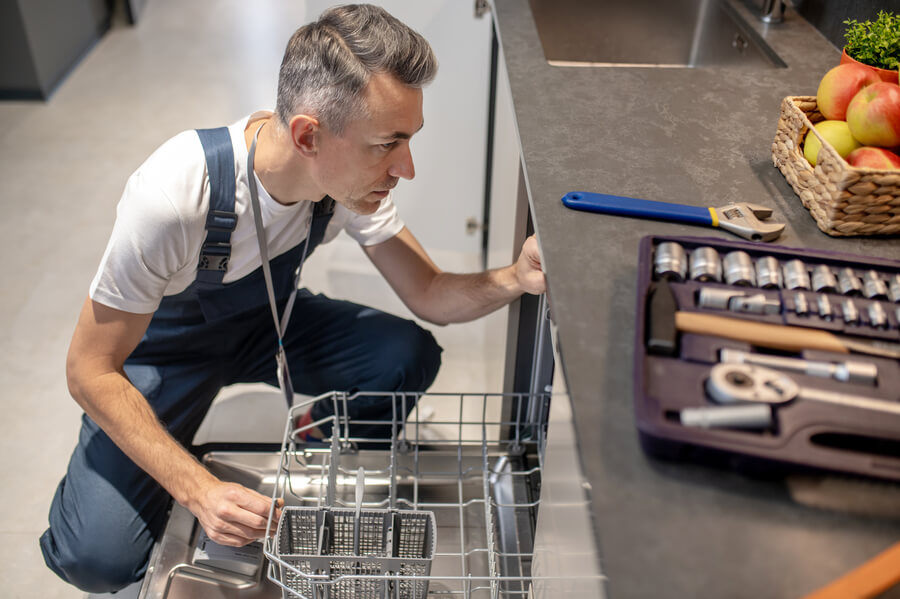If your dishwasher turns on itself, there could be many reasons. Their complexity varies widely from a faulty control panel and electrical issues to hacking. With the help of a user manual or a technician, you can quickly troubleshoot the problems.

This article looks at the most common causes and their solutions. This means you’ll have easier troubleshooting, so you can enjoy cleaning your dishes. So, let’s get into it.
Faulty Control Panel
One of the leading reasons for a dishwasher to turn itself on is having a faulty control panel. Often referred to as the control panel assembly or user interface, it is the part where you select and control various dishwasher functions.
As you’d expect, being faulty can cause the dishwasher to act erratically, such as turning itself on. So, what can cause the panel to become inaccurate?
- Moisture or corrosion: The presence of water can lead to erosion of electronic components and connectors, which can interfere with the functioning of the control panel.
- Software glitches: Most dishwashers, especially those with remote control capabilities, rely on advanced software to perform correctly. As expected, software glitches or bugs can cause the dishwasher to turn itself on. A software update can, however, resolve this issue.
- Control board problems: Ideally, the control panel is connected to the dishwasher’s control board. If the control board is faulty, the panel might misinterpret some signals, causing the dishwasher to start independently.
Other causes of a faulty control panel include button issues, age and wear, and impact damage.
Solution
To resolve a faulty control panel, you can follow these steps:
- Check for visible damage, such as a damaged touchpad.
- If there’s no visible damage, inspect for moisture and corrosion. If any, dry the affected areas and replace components that need replacing.
- You must put the dishwasher in diagnostic mode if there’s no damage or corrosion.
- Turn off the power to the dishwasher for safety. Ensure the dishwasher is disconnected from the power source completely.
- Wait for at least 10 minutes to allow residual electrical charge to dissipate. This helps you to reset the dishwasher.
- Turn the power back on.
- Locate the reset button and press it for three seconds.
- Some brands have a specific way to reset their dishwashers; as such, ensure to consult the user manual.
- After the reset, start a test cycle: quick wash or short cycle. This will help you gauge whether the dishwasher is working perfectly.
- Monitor the dishwasher during the running test and keep an eye on any error codes.
- If the problem persists, consider contacting a technician.
Faulty Door Latch
Since the software runs most smart dishwashers, a faulty door latch can cause the device to think the door is closed while it is not, or vice versa. As such, it may automatically turn itself on.
One of the leading causes is a faulty latch sensor. Ideally, the sensor senses whether the door is closed and initiates a clean cycle. If faulty, it may send an incorrect signal, causing the dishwasher to start as it thinks the door is closed.
Some dishwashers have a default setting that starts the dishwasher if it thinks the door is closed but isn’t receiving the right signal from the latch sensor.
A faulty door latch can also cause intermittent connection issues. This can cause the latch sensor to bypass safety checks, causing it to start independently.

Solution
To repair a faulty dishwasher, follow these steps:
- Ensure nothing is obstructing the door latch. Inspect for large debris and use a toothbrush to clean hard-to-reach corners. If the door is rusty, you may use a lubricant to fix the issue.
- Inspect for any visible damage, such as misalignment or knocks. If the door is misaligned, it might not send the right signal to the control panel. Ensure to perform the right repairs, such as realigning the door.
- It would help if you also inspected the door seals for any visible damage or debris. If the seals are damaged, replace them with new ones. The user manual should indicate the ideal brand to replace with.
- Once the latch and seals are in good shape, test the latch to ensure it operates as it should. Wait for a click sound that indicates the latch is engaged correctly.
- Consider replacing the latch with the appropriate brand if it is still loose.
- Should this not work, consider consulting a technician.
Electrical Issues
Another reason for your dishwasher turning on by itself could be electrical issues. This can include wiring within the control board or other parts of the dishwasher. If the wiring to the start button is faulty, the dishwasher might turn on itself.
While there are many reasons for electrical issues, the most common is moisture and condensation. As you’d expect, the dishwasher’s wiring is sensitive to moisture.
If some of the buttons on the control panel are loose, they might let in moisture, damaging the wiring and causing it to turn on itself. Besides, a voltage fluctuation or short circuit can cause the dishwasher to start by itself.
Solution
- Disconnect the dishwasher from the power source.
- Inspect the dishwasher control board and wiring for visible damage.
- Replace the wiring that needs replacement.
- Install a surge protector to mitigate electrical surges or spikes.
- Ensure your dishwasher is adequately grounded to prevent other electrical issues.
- Electrical issues can also cause faulty sensors. As such, inspect for any loose or damaged sensor connectors or wires.
- If there are any, repair and reconnect them as needed.
- If you need more confidence about how to solve electrical issues, make sure to consult a technician.
Remote Control Integration Issues
Most modern dishwashers come integrated with smart remote control features. They allow you to monitor and control the dishwasher from anywhere. If there are communication issues, the dishwasher might exhibit unexpected behavior, such as turning on by itself.
A malfunctioning app or device controlling your dishwasher might send a start command without input. Besides, interference in communication between the device and the dishwasher can also lead to the sending and receiving of unintended commands.
Solution
Check where the remote control device or app is functioning correctly. If it is an app, make sure to update it. If a recent update might be causing its malfunction, consider uninstalling the update.
Check your home Wi-Fi stability and signal strength, ensuring the dishwasher is within the ideal range. Often, interference from other electronic devices might lead to signal errors. If this might be the case, consider relocating the Wi-Fi router for a better signal.
Finally, reset the remote control device and disconnect it from the dishwasher. Use the manufacturer’s instructions to reconnect it. Another common reason is unauthorized access or hacking.
While a rarity, bad actors can hack into your smart home system, allowing them to control your appliances, including the dishwashing machine.
Solution
- strengthen the smart home system security by using unique and strong passwords for all your devices.
- If your smart home system supports two-factor authentication (2FA), enable it.
- Update the firmware of your dishwasher to patch any security vulnerabilities.
- If you’ve been hacked, change the password to your system and contact the manufacturer for further assistance.

Conclusion
As you can see, many reasons can cause your dishwasher to turn on itself. For example, a faulty control panel might send unintended commands. Besides, overpressed interface buttons might cause the dishwasher to start abruptly.
If your dishwasher is connected to a smart home system, weak Wi-Fi signal and hacking can lead to unintended behavior. As such, ensure the Wi-Fi signal is strong, and you use strong passwords.
